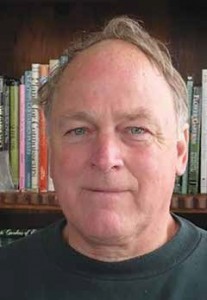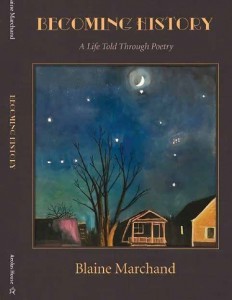Tanis Browning-Shelp
Daily visits with his centenarian mother Dorothy Marchand in the Grace Manor for two years gave Ottawa poet Blaine Marchand the impetus to write creatively about the experience. “My mother shared a lot of stories with me as we sat and chatted,” Marchand says. “She always loved telling stories. She would act them out—capture the mannerisms and the voices—regaling me with tales from her past and present, all with complete clarity.”
It took Marchand seven years to complete the project, and his seventh book of poetry, Becoming History (published by Toronto’s Aeolus House), tells the story of his mother’s life from 1913 to 2016. “Abandoned by her parents, she was taken in by an older couple, James and Margaret Irish, who lived at 109 Echo Drive, where the Teron condos are now,” Marchand explains.
The first section of the book recreates his mother’s childhood with the Irishes. “The poems are centered and textured by her years in Old Ottawa East,” Marchand says.

Ottawa poet, Blaine Marchand, spent seven years completing his seventh book of poetry, Becoming History. Photo Supplied
“My mother talked about the
neighbourhood her whole life, and it
came back to her in even more vivid
detail at the end. ‘
Oh, there’s the Pretoria Bridge / I
crossed over, that’s Downing’s where / I
went for penny candy.’ She lived with the
Irishes until she married at age 24 in the
Canadian Martyrs Parish (the old one).
The book recreates those years and her
experiences in the neighborhood.”
Marchand originally conceived of the book in the context of archeology. “It was like examining artifacts—portraits, letters, teacups, postcards—from the lives of ordinary people, not prime ministers, or monarchs,” he says. “I believe that these aspects of our everyday lives are as much a part of history as was the history we recorded.”
“I’ve heard many people say that they wished that they had asked their own parents about their lives,” Marchand says. “I was always curious, even as a child.” In the poem Equations, which appears in the section I Always Remember (1952-1964), in which Marchand writes about his own childhood, he examines his mother’s wedding rings as she washes the dishes and gets confused by the name Irish inscribed on the inside of them. He questions her, wanting to understand why.
I wait until you pull the stopper and the water coils down the drain, pluck up my courage. Why is Irish on your ring? Nana and Grandad are Harris.
“My mother met her biological parents and brother when she was 26. Initially, they had a joyful reunion, and an initial closeness; but, in truth, my mother never got over the fact that her own mother abandoned her.”
Home is one of the book’s core themes. Even though Dorothy Marchand lived through “Two World Wars. Revolutions, uprisings, four monarchs,” home is what she remembers when she looks back. “Our roots are important,” Marchand says. “To me, this book is also the story of a city and of two neighbourhoods—Old Ottawa East and Ottawa West, where my parents raised their eight children. Geography, in a way, repeated itself in my mother’s life.
Echo Drive, a wedge between canal and the crosshatch of railway lines…Ottawa West where the pattern repeats Between rail line and river…

The cover painting for Blaine Marchand’s latest poetry book captures the winter sky above his mother’s home (the house in the middle) and is entitled Planets Align Over Dorothy’s by D.H. Monet. The artist lived across the street from Dorothy Marchand in Ottawa West in her later years. Photo Supplied
As one reviewer of the book, Dave Allston, states: “Becoming History is not just the story of one woman’s life; it is a memorial that evokes thoughts and feelings borne from our own experiences.” The first poem in the collection mentions “the Spanish influenza / ravaging Spanish influenza” and a later poem describes Dorothy’s own childhood experience being isolated in hospital with diphtheria and having her throat burned:
“Gowned / in white, with a mask so not
to breath my breaths. I am told I am a/
reservoir of infection, a carrier.”
These references resonate hauntingly for us today as we live with COVID.
Marchand points out that not everybody succumbs to dementia when they age. “You don’t often hear about that,” he says. “One of the palliative care nurses told me that, in her experience, positive people often live long lives. I don’t know if that is true, but my mother positively embraced life. She believed that she was lucky. She was renowned for it. She taught me what it is to be elderly.”
You can order a signed copy of Blaine Marchand’s book at any time by emailing him at becominghistorypoetry@gmail.com.
![]() Author Tanis Browning-Shelp (http://www.browning-shelp.com) pens her Maryn O’Brien Young Adult Fiction series, published by Dog-Eared Books, from her home in Old Ottawa East. Contact tanis@browning-shelp.com if you have information about artists or art events that you believe would enrich our community members’ lives.
Author Tanis Browning-Shelp (http://www.browning-shelp.com) pens her Maryn O’Brien Young Adult Fiction series, published by Dog-Eared Books, from her home in Old Ottawa East. Contact tanis@browning-shelp.com if you have information about artists or art events that you believe would enrich our community members’ lives.






